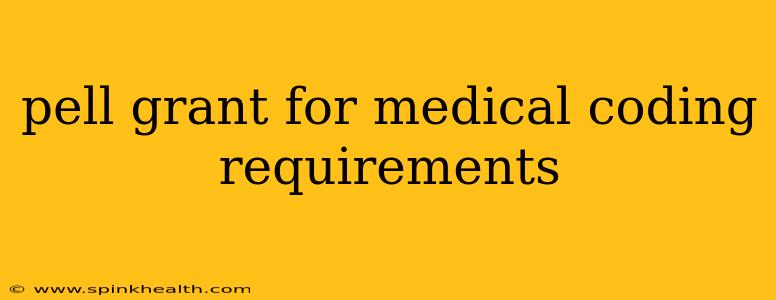The allure of a career in medical coding is undeniable. It offers a blend of intellectual stimulation, crucial contributions to the healthcare system, and the promise of a stable future. But the journey to becoming a certified medical coder often involves financial considerations. Many aspiring coders wonder, "Can I use a Pell Grant for medical coding?" The answer, thankfully, is a qualified "yes," but understanding the nuances is key. This journey isn't just about grants; it's about dedication, planning, and navigating the educational landscape effectively. Let's unpack this together.
What is a Pell Grant?
Before diving into the specifics of using a Pell Grant for medical coding, let's define the term. A Pell Grant is a federal grant awarded to undergraduate students who demonstrate exceptional financial need. Unlike loans, Pell Grants don't need to be repaid. This makes them a powerful tool for aspiring professionals, especially those pursuing in-demand fields like medical coding. The amount awarded depends on your financial need, cost of attendance, and enrollment status.
Can I Use a Pell Grant for Medical Coding Programs?
Yes, you can use a Pell Grant to help finance your medical coding education. However, the eligibility depends on factors like:
- Program Accreditation: Your chosen medical coding program needs to be accredited by a reputable agency. Accreditation signifies the program meets specific educational standards and prepares students for successful careers. The Department of Education often recognizes programs accredited by organizations like the Commission on Accreditation of Allied Health Education Programs (CAAHEP) or the Accrediting Bureau of Health Education Schools (ABHES).
- School Eligibility: The educational institution offering the medical coding program must also participate in the federal student aid program.
- Financial Need: You must demonstrate financial need based on the Free Application for Federal Student Aid (FAFSA) form. The FAFSA will assess your family's income, assets, and other financial details to determine your eligibility.
What are the Requirements for a Pell Grant?
Obtaining a Pell Grant requires careful attention to detail. Here's a breakdown of the essential steps:
- Complete the FAFSA: This application is the gateway to federal student aid. Complete it accurately and promptly to avoid delays. The FAFSA assesses your eligibility for grants, loans, and work-study programs.
- Maintain Satisfactory Academic Progress (SAP): Once awarded, you must maintain satisfactory academic progress to retain your eligibility. This generally includes maintaining a minimum GPA and completing a specified number of credits per term.
- Enrollment Status: You typically need to be enrolled at least half-time to receive a Pell Grant. The exact requirements may vary depending on the institution.
How Much Financial Aid Can I Get?
The amount of financial aid you can receive, including Pell Grants, varies. Several factors play a role, including your demonstrated financial need, the cost of your education, and the type of program you are enrolled in.
What if I Don't Qualify for a Pell Grant?
Don't despair! If you don't qualify for a Pell Grant, there are other avenues for funding your medical coding education. Explore options like:
- Scholarships: Numerous organizations offer scholarships specifically for students in healthcare-related fields. Research scholarship opportunities related to medical coding or healthcare administration.
- Grants: Several state and private organizations offer grants for students pursuing specific career paths.
- Loans: Federal and private student loans can supplement your financial aid package.
What Are the Career Prospects After Medical Coding School?
The job market for certified medical coders is strong and projected to grow. With the increasing demand for healthcare services and the expanding use of electronic health records, skilled medical coders are highly sought after in various healthcare settings. This makes investing in your medical coding education a smart career move.
Conclusion:
Securing a Pell Grant to fund your medical coding education is entirely feasible. By thoroughly researching accredited programs, diligently completing the FAFSA, and maintaining satisfactory academic progress, you can pave your way toward a fulfilling and financially accessible career in this vital field. Remember to explore all your financial aid options to build a comprehensive funding strategy for your educational journey. The rewards of a successful career in medical coding are significant—with careful planning and determination, you can achieve your professional goals.

